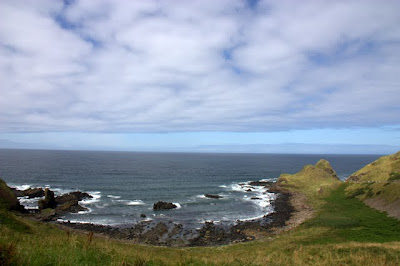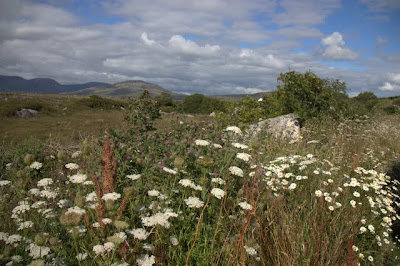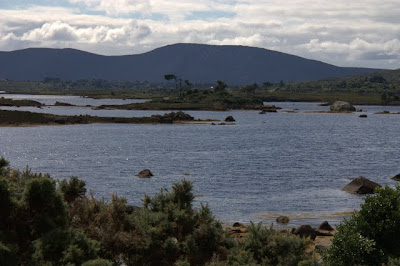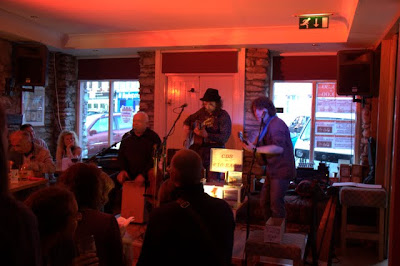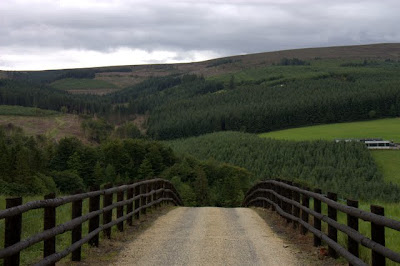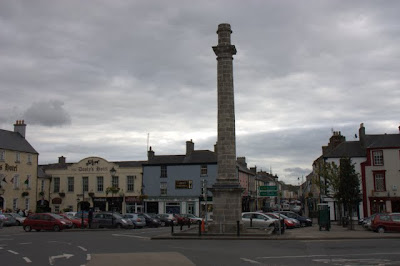Northern Ireland
I suppose I knew that Northern Ireland was part of the United Kingdom and a completely different country from the Republic of Ireland – I even wrote a paper in college about the Troubles – but it wasn’t a fact I focused upon. I sort of just lumped both countries together into one amorphous concept called Ireland until we visited Northern Ireland. You don’t realize right away that you are in a different country when you cross the border. Many things are the same as the Republic: the pubs with Guinness signs outside; the sheep, Guinness, and shamrock merchandise in the tourist shops; the chatty people – they’re all there. But the British influence is undeniable.
First of all, there’s the different currency thing. If Americans get screwed when using the euro, the pound is even worse. Although the exchange rate is down considerably from a couple of years ago, everything costs us almost 60% more than it would at home. And it didn’t always seem like prices were adjusted accordingly, which meant that if we were paying 4 euros for a pint of Guinness down south, we now were paying 4 pounds. We lost track of our budget in the Republic sometime after the second round of Guinness, and we certainly weren’t going to make up any lost ground in Northern Ireland.
Second, there’s the accents. The Irish brogue down south was challenging sometimes, but always decipherable. The accents up north are thick; somewhere between an Irish brogue and the English lilt. It is a toss-up who was the hardest to understand: the woman at our B&B in Derry or the farmer in County Armaugh. I think the farmer wins. Even though he was speaking English, we only comprehended every third word. Other guests at the farmhouse told us to listen faster in order to figure out what he was saying.
Third, it just looks different. Northern Ireland feels more compact and congested than the south. Even when you are in farmland, cities and towns are not far away. There are less pubs and more bars (for whatever the difference is).
Then there’s the whole matter of the Troubles. There was no mention of the Troubles when we were travelling through the Republic, but it is impossible to ignore the conflict when travelling through Northern Ireland. The relationship between Northern Ireland, the Republic and Great Britain is long, complicated, and intertwined. In a nutshell, the conflict has to do with politics, religion, roots, nationalism, poverty, discrimination, violence, and pride. As an outsider, it seemed to me that Northern Irelanders are trying to heal and move past the Troubles, but the scabs over the wounds are tenous. The tourism board is trying hard to divert everyone’s attention away from the past. The slick, trendy brochures focus on what is going on in the country’s present, with only scant references to the history. But we saw reminders of the Troubles with our own eyes: the British flags that fly to display loyalty to the crown; the Irish colors painted on lamp posts and curbs; the attempted violence that is still occurring; the pieces of car bomb in the ground on a farm; the uneasiness when one strays into the neighborhood of the others; the imposing murals that dominate the neighborhoods; and the gate dividing the Catholic/Republican and Protestant/Unionist neighborhoods that is still locked every night.
Of course, Northern Ireland is so much more than the problems they have had in the past. The all too recent history is fascinating to learn about, but Northern Ireland has beauty, warmth, and attractions in its own right. I was glad we made the decision to travel there; it presented a whole picture and clarified the amorphous Ireland in my mind.
p.s. Hope everyone in the states is having a happy and fun Labor Day weekend!
Boglands
West of Galway is the Connemara, an area of Ireland that looks completely different than the rest.
The greens are not as vibrant, but wildflowers grow in abundance and add an accent color we didn’t see elsewhere. This is the land of bogs.
In every direction is a new scenic drive: pockets of water in between rocky landscapes; sea cliffs and coast line; the Twelve Pins mountain range; and, of course, sheep.
We stayed in Clifden, a quaint little town where we caught some live music (complete with a guy playing a box drum).
Then we moved on to Westport, which I would describe as sophisticated with the glaring exception of our accommodations.
Everything was expensive, so we ended up taking a room in the back of a pub. The bathroom smelled so strong of mildew that we had to keep the door shut for fear that it would infiltrate the room. We both decided to forgo showering and just held our breath when our bladders finally demanded that we use the facilities. It was one of the few nights I had to use the sleep sack. Fun times.
Get Out the Map
Get out the map
Get out the map and lay your finger anywhere down
We’ll leave the figuring to those we pass on our way out of town…
– Indigo Girls
Before I left, Sally, one of my favorite lawyers that I worked with at my old firm, told me a story about how one time her and her husband just got into the car and drove without a plan. There is something romantic about meandering about aimlessly. I’ve always daydreamed about going to an airport and picking the next flight out of town, no matter what its destination.
As much as we have more flexibility on this trip than most Americans have when they travel, we still typically have some semblance of a plan, even if we end up changing it later. As romantic as travelling without a plan sounds, I can’t bring myself to do it completely. To truly travel freely, you need to not care where you go. You need to not care how long you stay somewhere or what you see. You also need to not care how much money you spend. We probably planned less than most; I always dreamed of going somewhere, but never the specifics once we got to somewhere. We used all of our pre-trip planning time just to have a rough idea of the countries we wanted to visit. People kept asking me before we left, so, where are you going to visit in Japan? In South Africa? In Spain? I never had an answer. This means we do most of our planning on the fly. Although we usually procrastinate in making our plans, eventually we always come up with something. It is too hard otherwise, especially if you want to find efficient, low-cost flights, or go somewhere in certain seasons, or sometimes to even get into a country. I still have not shed my anxious, perfectionist self enough to truly throw all plans out the window.
But sometimes it is fun to truly not care where you will be for the next few days, to pick your next destination by where your finger lands on the map. The first time we didn’t really have a concrete plan was when everyone left us in Kilkenny to fly home. Our friends kept asking us where we were going after they left. It is a foreign concept to not have a planned itinerary for travel to Americans who are used to making the most out of limited time. Compared to our friends, and compared to our pre-trip selves, after four months of travel, we were now becoming somewhat used to not knowing where we were sleeping that night (even if there are some days I am not entirely comfortable with that concept). Sitting in the car in Kilkenny, we kept asking each other, so, where should we go? We had just shy of two weeks before we had to return the rental car in Dublin to travel wherever we wanted in Ireland, with our only goal of wanting to eventually head up to Northern Ireland. We hadn’t even booked our tickets to South Africa yet (or really decided exactly where we wanted to go in Africa).
We decided to head north straight away through a mountain pass marked as scenic on our map, and then make a detour over to the part of the penninsula past Galway we hadn’t seen. The sad truth is, going someplace random means that, more often than not, you end up in towns like Birr. Situated square in the middle of Ireland, Birr, and the surrounding areas, lack the dramatic scenery of the coasts. Best I can tell, Birr’s claim to fame is that the first automobile fatality occurred there when an early model car collided with a horse and buggy. Our options for dining on a Saturday night were Indian or miscellaneous Asian food. Birr would have been a good town to check out local pub life, because surely there were no other tourists there, had we not been detoxing after the ten days with our friends from home. Birr is a perfectly fine town, but sometimes there is a reason why certain areas are touristy and others are not.
